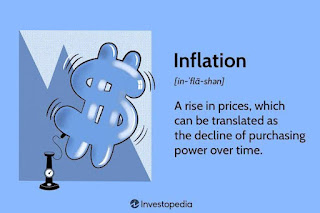Inflation refers to the sustained increase in the general
price level of goods and services in an economy over a period of time. It means
that, on average, prices are rising, and the purchasing power of money is
decreasing.
Inflation is typically measured using an inflation rate, which represents the percentage change in the
average price level compared to a previous period, usually on an annual basis. Economists and policymakers closely monitor inflation as it can have significant effects on various aspects of the economy, including consumers, businesses, wages, investments, and government policies.
Inflation can be caused by various factors, including:
1.
Demand-Pull Inflation: This occurs when there is
excess demand in the economy, driving up prices. It can happen when consumer
spending increases, government spending rises, or there is an expansionary
monetary policy that increases the money supply.
2.
Cost-Push Inflation: This occurs when the costs
of production, such as wages or raw materials, increase, leading to higher
prices for goods and services. Factors that can contribute to cost-push
inflation include higher energy prices, increases in wages due to labor market
conditions, or supply disruptions.
3.
Built-in Inflation: This type of inflation
arises from the expectation that prices will continue to rise in the future. If
individuals and businesses expect inflation, they may factor it into their
pricing and wage-setting decisions, leading to a self-reinforcing cycle of rising
prices.
4.
Imported Inflation: When a country imports a
significant portion of its goods and services, changes in the prices of
imported goods, such as commodities or foreign exchange rates, can impact
domestic prices and contribute to inflation.
Inflation can have both
positive and negative effects on the economy. Some potential benefits of
moderate inflation include stimulating spending and investment, reducing the
real burden of debt, and allowing for relative price adjustments. However, high
or volatile inflation can have adverse consequences, such as eroding purchasing
power, creating uncertainty, distorting resource allocation, and harming those
on fixed incomes.
Central banks and monetary authorities play a key role in managing inflation by implementing monetary policies, such as adjusting interest rates and controlling the money supply, to achieve price stability and promote sustainable economic growth.
It's important to note that inflation rates and their impacts can vary across countries and over time. Monitoring and managing inflation is a crucial aspect of economic policy and decision-making to maintain stable and well-functioning economies.





inflation described in a well manner
ReplyDelete